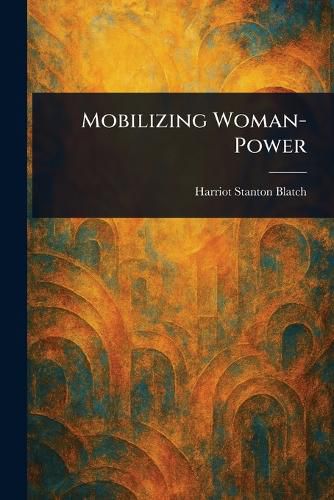Readings Newsletter
Become a Readings Member to make your shopping experience even easier.
Sign in or sign up for free!
You’re not far away from qualifying for FREE standard shipping within Australia
You’ve qualified for FREE standard shipping within Australia
The cart is loading…






This title is printed to order. This book may have been self-published. If so, we cannot guarantee the quality of the content. In the main most books will have gone through the editing process however some may not. We therefore suggest that you be aware of this before ordering this book. If in doubt check either the author or publisher’s details as we are unable to accept any returns unless they are faulty. Please contact us if you have any questions.
"Mobilizing Woman-Power" by Harriot Stanton Blatch offers a vital perspective on the profound social changes spurred by World War I, particularly concerning women's roles and the burgeoning feminist movement. This historical account examines the significant contributions of women to the war effort and their increasing demands for suffrage and equality.
Exploring the multifaceted impact of the war on society, this book sheds light on the ways in which women actively participated in and shaped the course of history during this pivotal period. Blatch meticulously documents the evolving landscape of women's rights and their mobilization within various sectors, providing invaluable insights into the era's social and political dynamics.
A crucial historical document for anyone interested in World War I, women's studies, or the fight for social justice, "Mobilizing Woman-Power" remains a relevant and insightful exploration of a transformative period in history.
This work has been selected by scholars as being culturally important, and is part of the knowledge base of civilization as we know it.
This work is in the public domain in the United States of America, and possibly other nations. Within the United States, you may freely copy and distribute this work, as no entity (individual or corporate) has a copyright on the body of the work.
Scholars believe, and we concur, that this work is important enough to be preserved, reproduced, and made generally available to the public. We appreciate your support of the preservation process, and thank you for being an important part of keeping this knowledge alive and relevant.
$9.00 standard shipping within Australia
FREE standard shipping within Australia for orders over $100.00
Express & International shipping calculated at checkout
This title is printed to order. This book may have been self-published. If so, we cannot guarantee the quality of the content. In the main most books will have gone through the editing process however some may not. We therefore suggest that you be aware of this before ordering this book. If in doubt check either the author or publisher’s details as we are unable to accept any returns unless they are faulty. Please contact us if you have any questions.
"Mobilizing Woman-Power" by Harriot Stanton Blatch offers a vital perspective on the profound social changes spurred by World War I, particularly concerning women's roles and the burgeoning feminist movement. This historical account examines the significant contributions of women to the war effort and their increasing demands for suffrage and equality.
Exploring the multifaceted impact of the war on society, this book sheds light on the ways in which women actively participated in and shaped the course of history during this pivotal period. Blatch meticulously documents the evolving landscape of women's rights and their mobilization within various sectors, providing invaluable insights into the era's social and political dynamics.
A crucial historical document for anyone interested in World War I, women's studies, or the fight for social justice, "Mobilizing Woman-Power" remains a relevant and insightful exploration of a transformative period in history.
This work has been selected by scholars as being culturally important, and is part of the knowledge base of civilization as we know it.
This work is in the public domain in the United States of America, and possibly other nations. Within the United States, you may freely copy and distribute this work, as no entity (individual or corporate) has a copyright on the body of the work.
Scholars believe, and we concur, that this work is important enough to be preserved, reproduced, and made generally available to the public. We appreciate your support of the preservation process, and thank you for being an important part of keeping this knowledge alive and relevant.